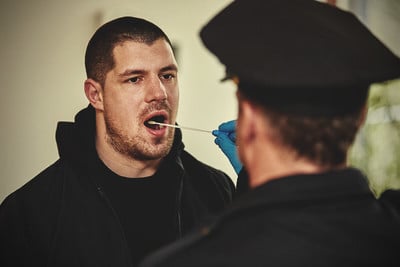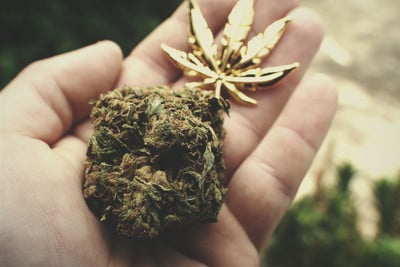.

How to Sleep Without Weed
If you've been smoking weed for a while, it very likely has a strong effect on your sleep. And if you come to stop smoking weed, you'll likely experience some troubles achieving a peaceful slumber. In this article, we look at why this happens and what you can do to mitigate it.
Contents:
Cannabis has long been used to address a variety of ailments and issues—chief among them being sleep issues like insomnia. However, when the time comes to take a break from weed, or stop altogether, a significant challenge arises: how do you fall asleep? And how do you stay asleep?
With that in mind, this article aims to explore how to sleep without cannabis, specifically for those who have been using cannabis for a long period of time. Even if you haven’t been using it to help you sleep, you may find that once you stop, you struggle to sleep without it. The good news is that these effects don’t tend to last long, and there are plenty of measures you can take to get a good night’s rest without weed.
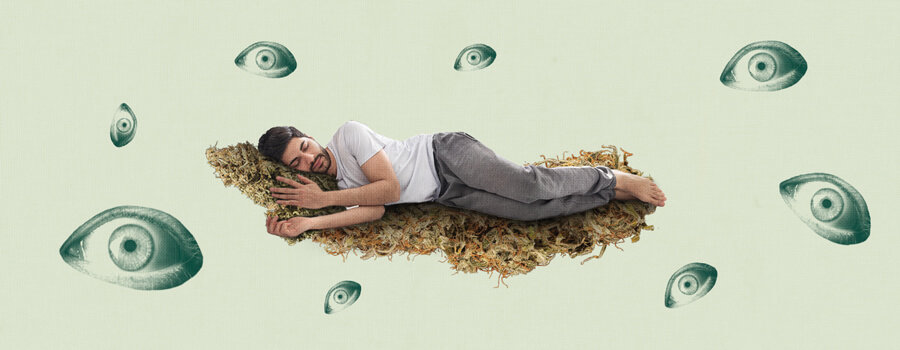
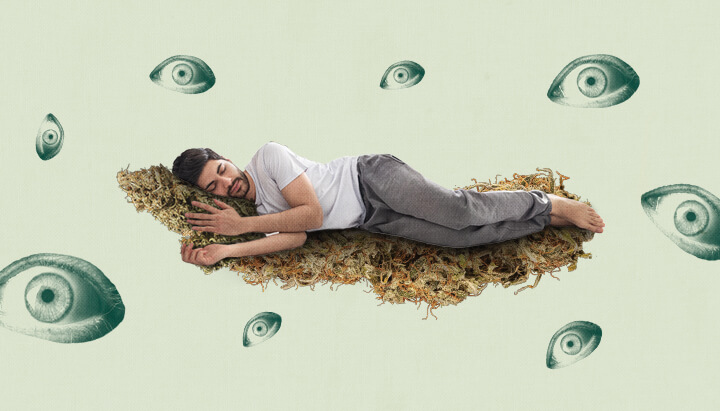
Understanding Cannabis and Sleep
The relationship between cannabis and sleep is complex, and the plant can be both a help and a hindrance in this area. On the one hand, many users turn to cannabis in the hope that it might help with insomnia or other sleep disorders, often finding that it helps them fall asleep faster and enjoy deeper, if not more restful, sleep. However, while sleep might be easier to attain, the quality of sleep can be negatively impacted.
Let’s take a look at how cannabis affects sleep.
-
How Cannabis Affects the Sleep Cycle
Cannabis influences the endocannabinoid system (ECS), which plays a crucial role in regulating various physiological processes—sleep among them. The primary compounds in cannabis, THC (tetrahydrocannabinol) and CBD (cannabidiol), interact with receptors in the brain and body that influence sleep patterns and our level of alertness and calm.
THC is well-known for its relaxing, soporific effects, making even the most energetic of people sleepy and lethargic. THC is thought to decrease the time[1] it takes to fall asleep and increase the amount of time[2] we spend in deep, slow-wave sleep. However, have you ever noticed that you dream less when you smoke weed, or maybe you smoke weed all the time and you’ve ceased to dream altogether? This is because THC reduces REM sleep and, over time, actually degrades the quality of rest we get from sleep, even if we might spend more time unconscious.
The health implications of this are uncertain, but this tampering with natural sleep cycles is unlikely to be healthy in the long term.
| THC | CBD + THC |
|
Suppresses REM sleep |
Increase awake activity during sleep |
| Sleep-promoting effect | Counteracts residual soporific effects of higher THC doses |
| Sleepy (sometimes moody) feeling in the morning problem-sloving ability affected |
| THC | THC + CBD |
|
Suppresses REM sleep |
Increase awake activity during sleep |
|
Sleep-promoting effect |
Counteracts residual soporific effects of higher THC doses |
|
Sleepy (sometimes moody) feeling in the morning problem-sloving ability affected |
-
Potential Long-Term Effects of Relying on Cannabis for Sleep
Cannabis may well have a use as a short-term option for managing acute sleep problems. If you need to break a cycle of poor sleep due to stress or anxiety, then cannabis could potentially be a helpful tool. However, if you regularly come to depend on cannabis for sleep, then not only will it affect the overall quality of your sleep, but you’re also likely to become at least partially dependent on the drug when it comes to falling asleep, which can be problematic.
Why Consider Sleeping Without Cannabis?
Pausing or totally ceasing your cannabis use, sometimes referred to as a tolerance break, can be a very beneficial choice for many people. Whether it's to reset the body's tolerance, address dependency issues, or simply to experience life without the influence of cannabis, there are many good reasons to try living and sleeping without the help (or hindrance) of weed.
-
Tolerance
The body builds up a tolerance to cannabis, and most other drugs, over time and with continued use, meaning that incrementally higher doses are required to achieve the same effects. In fact, the reality is that the initial effects of cannabis can never be rediscovered if you frequently use the drug, no matter how high the dose is.
This can lead to increased consumption, which may not only be costly but can also exacerbate dependency. Taking a tolerance break can help to reset the mind and body a little, and can give you a period without the drug to gain a little clarity and understand whether your cannabis use is healthy. Use this time to reevaluate!
-
Dependency for Sleeping
Relying on cannabis as a sleep aid can create a psychological and physiological dependency, which will ultimately make your sleep worse. It can be a cruel fate. If you struggle to sleep and discover cannabis can help you, it can feel like a miracle. To then come to terms with the fact that it can only work if used sparingly can be hard to accept. But accept it you must.
With continued use, the body may struggle to initiate sleep without the presence of cannabis, leading to a cycle where sleep problems worsen when cannabis is not available. Breaking this dependency can lead to more sustainable, natural sleep patterns.
-
Physical Health Problems
Most people who use cannabis smoke it, and as we all know, smoking causes a whole slew of negative and very real health problems. From respiratory problems, to mouth infections, to issues with vision, the inhalation of combusted materials is not good for us. Though there are smoke-free ways to use cannabis, you may decide that if it’s time to stop smoking, it might be time to stop using cannabis altogether.
Natural Ways to Improve Sleep
Transitioning away from cannabis as a sleep aid can be challenging, especially if you’ve been using it for a long time and/or your relationship with sleep is complex. However, there are numerous natural methods to improve sleep quality. Incorporating these practices can help to create a sustainable sleep routine that doesn't rely on external substances, and that will ultimately improve both your relationship with sleep and your overall sleep quality.
- Establish a Consistent Sleep Routine
- It sounds boring, but it really does work. The brain is a habit machine, and sleep is one of our most habitual behaviours. If you go to bed and get up at the same time every day, your sleep will become so much better!
One of the most effective and brutal ways to do this is to wake up at the same time every day. While you might experience a few days of exhaustion while your body adapts, it won’t take long until you adjust to waking up at that same time. Establishing a set time to wake up is one of the most powerful ways to develop a healthy sleep–wake cycle. - Avoid Stimulants (and Other Drugs) Before Bed
- Try to steer clear of all substances before bed. If you generally struggle to sleep, this is especially important. For sensitive people, caffeine is best avoided for many hours before you want to go to bed, and for some it’s best avoided altogether.
It’s also best to avoid alcohol. Even though drinking can make it easier to fall asleep, it makes staying asleep harder and it wrecks the quality of sleep—as most of us well know! What’s more, relying on alcohol to fall asleep just replaces one drug with another, which probably isn’t what you’re aiming for when you stop smoking weed. - Sleep-Promoting Foods
- Diet can also play a role in promoting better sleep. Foods rich in tryptophan, such as turkey, nuts, and seeds, can help to increase the production of serotonin in the day and melatonin at night—a hormone that promotes sleep. Magnesium-rich foods like leafy greens and bananas can also help relax the body and prepare it for sleep. Additionally, consuming foods that contain natural melatonin, like cherries, can help to regulate the sleep–wake cycle.
While some soothing foods will help to calm us down, the key is to have a diet that generally includes foods such as those listed above. If you eat a mouthful of one of these foods just before going to bed, don’t expect to see any difference. Rather, integrate them into your diet, and consider them part of a healthy relationship with sleep. They will not work like a sleeping pill, so don’t be fooled! - Exercise: Timing Matters
- Regular exercise is one of the best ways to improve sleep quality and overall quality of life, but timing is crucial. Exercising too close to bedtime can have the opposite effect, making it harder to fall asleep. Aim to complete intense workouts earlier in the day and focus on calming activities like yoga, walking, or breathing exercises in the evening to promote relaxation. Integrate exercise regularly into your life and you’ll find your sleep cycle begins to take care of itself. And expect to become tired earlier in the evening!
- Managing Stress
- Stress will wreck your sleep—there’s nothing quite like it. There are all manner of stress-reduction techniques out there: meditation, yoga, therapy, mindful breathing, swimming, and so on. While all of these are very useful tools, you should really aim to reduce the source of stress, rather than just targeting the symptoms. Life is, of course, stressful sometimes. However, if you live a chronically stressful life, there’s no amount of counterbalancing you can do that will change this, so change your life if necessary! You’ll be grateful for it.
- Gardening as a Relaxation Technique
- Engaging in gardening, particularly growing your own plants, can be a therapeutic activity that reduces stress and increases feelings of relaxation. Gardening allows you to connect with nature, which has been shown to improve mental health and well-being. For those who enjoy cannabis cultivation, tending to your plants can provide a calming routine that may help you transition away from using cannabis for sleep.
- Forest Bathing: Connecting With Nature
- Forest bathing, or simply spending time in nature, has also been shown to reduce stress and improve health. See the link with gardening? Our green friends are good for us, and we don’t need to smoke them to experience their benefits! Walking in the woods or simply being in a natural environment can have a calming effect, making it easier to unwind and prepare for sleep. Incorporating nature into your daily routine, whether through gardening or forest bathing, can provide a natural way to reduce stress and promote better sleep.
- A Grateful Approach to Calm Down
- Cultivating gratitude is a simple yet powerful way to calm the mind before bed. Taking a few moments each night to reflect on the positive aspects of your day can shift your focus away from worries and create a more peaceful state of mind, conducive to sleep.

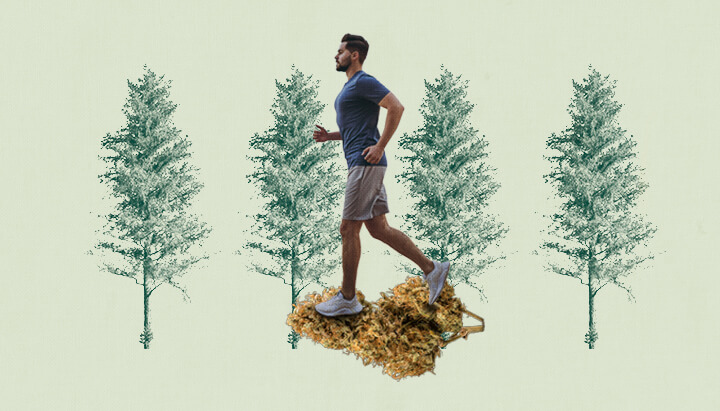
Managing Sleep Issues During a Tolerance Break
If you're taking a break from cannabis and experiencing sleep issues, there are several strategies you can employ to manage these challenges effectively.
-
Gradually Reduce Cannabis Use
Rather than quitting cannabis abruptly, consider gradually reducing your intake. This can help minimise withdrawal symptoms, including insomnia. By tapering off slowly, you give your body time to adjust, making the transition smoother.
-
Prepare in Advance
Start incorporating healthy sleep routines before you begin your tolerance break. Establishing these habits early can help your body adapt more easily when you stop using cannabis. By the time you take your break, your body will already be accustomed to these natural sleep-promoting practices.
-
Be Patient
It's important to recognise that it may take several weeks for your body to adjust to sleeping without cannabis. During this time, it's crucial to be patient with yourself. Sleep disturbances are common during a tolerance break, but with time, your sleep patterns will stabilise as your body recalibrates.
-
Listen to Your Body
Every individual’s experience with sleep and cannabis withdrawal is unique. While some people may adjust quickly, others may take longer to find a new sleep rhythm. It's essential to listen to your body during this process.
-
Recovery Takes Time
Understand that recovery from cannabis dependency, especially regarding sleep, can take time. Give yourself grace during this period and focus on maintaining healthy habits that support your overall well-being.
-
Seek Professional Help if Needed
If sleep problems persist despite your best efforts, consider seeking professional help. However, try to avoid relying on sleep medications, as they can lead to dependency and may only replace one problem with another. Instead, explore natural therapies and consult with a healthcare professional who can guide you through the process.
Sleeping Without Weed: It Can Be Done
Transitioning away from cannabis as a sleep aid can be challenging, but it is entirely achievable with the right strategies. By understanding the relationship between cannabis and sleep, considering the reasons for taking a break, and adopting natural sleep-promoting practices, you can successfully navigate this transition. Remember to be patient with yourself, listen to your body, and seek support if needed. Over time, you'll find that restful, natural sleep is possible without relying on cannabis.
- Cannabis use in patients with insomnia and sleep disorders: Retrospective chart review - PMC https://www.ncbi.nlm.nih.gov
- Effects of Cannabinoids on Sleep and their Therapeutic Potential for Sleep Disorders - PMC https://www.ncbi.nlm.nih.gov


























